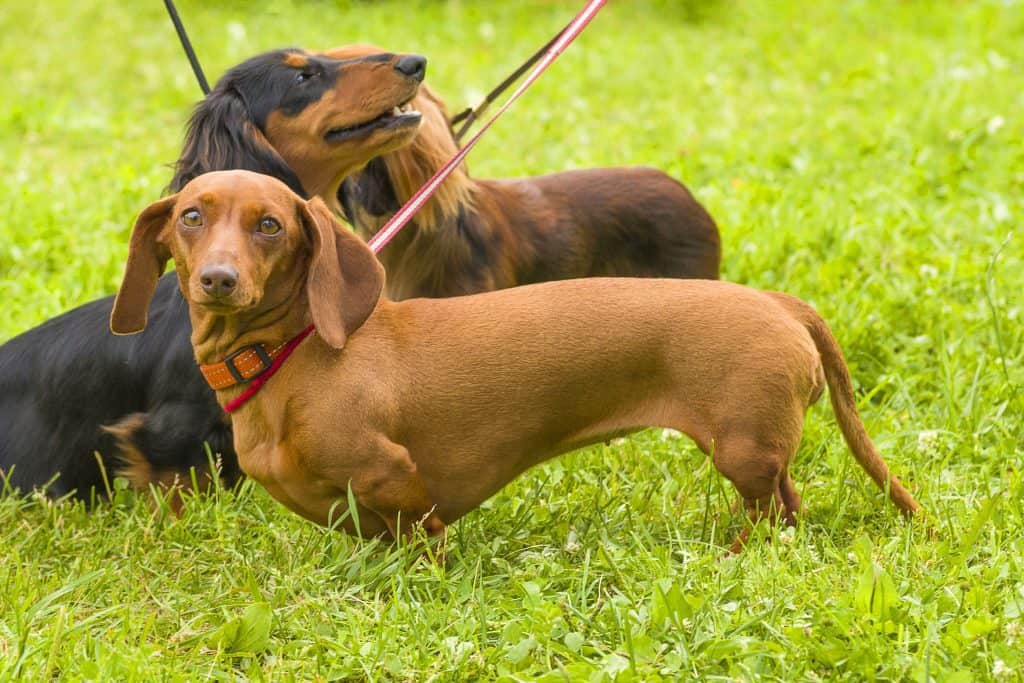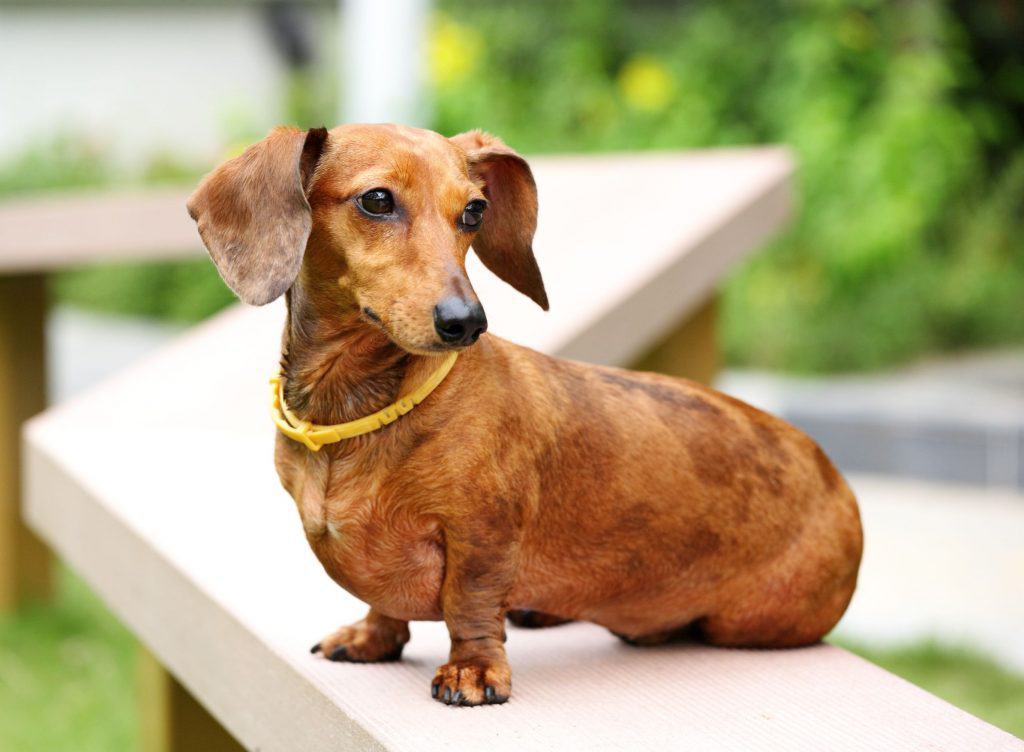Dachshund Temperament: What’s it Like Owning One?

One of the most important things to consider before bringing a dog into your family is what they will bring to the home. Dogs each have their own little personalities and quirks. My dachshund has been in my family going on a decade. From first-hand experience, here is a good idea of what owning a dachshund could be like.
So, what’s it like owning a dachshund? If you are looking for a loyal, loving companion who will make you laugh and who will comfort you when you cry, a dachshund is that perfect companion. If you aren’t ready to handle stubbornness, independence, and a wariness of strangers, a dachshund might not be the right dog breed for you.
This, of course, is only a brief explanation of the intimate details of owning a dachshund. So, in the rest of this article, I will take my experience and research and try to explain what exactly it’s like to own one of these incredible creatures.
First, I will go through the things to be aware of before owning a dachshund, after which I will explain the amazing aspects of owning one.
Dachsund Personalities
Difficulty to Train
Dachshunds are very clever and intelligent as well as incredibly stubborn. They do not like to be told how to do things and will often do things their own way. This fact can make it incredibly difficult to train them. Not impossible, just difficult.
So, if you aren’t prepared to spend a lot of time and patience in training your dog, they might not be the best fit for you.
Since they were bred to hunt, they problem solve and act without step-by-step commands. They’re bred to launch, attack and hunt all on their own. So that strong will is engrained in them. People say, “Dachshunds train you.” Not the other way around.
I witnessed this as my family and I tried training my dachshund, Scamp. We had never before owned a dog so we were new to the training process as a whole. But, we never expected it to be so challenging. He’s always been a good boy. He is good inherently, as are most dogs. But when it comes to commands and orders, he doesn’t take to those too well.
If you aren’t prepared to spend a lot of time and patience training a dog, dachshunds might not be the best fit for you.
Eventually, we kind of gave up on training him. He can sit, he can lay and he can bark. But that’s where it ends. Everything else is kind of up to him, especially on walks.
Even after trying to train him to walk next to me and walk at a normal speed, he still gets outside and wants to run for the hills.
He knows to stop before we cross the street and knows to cross the street when I say so. But, he follows these commands very much at his own will. And when he wants to do his own thing, he will.
Dachshunds are very intelligent, loyal and stubborn companions. This means that if taught, they will understand commands. But the problem comes in with they will only follow commands if they want to.
So, that’s why when training these pups, it is crucial to train them when they are most adaptable, being their first year.
It is also crucial to train them consistently and firmly, and never give in to their will. This will let them think they’re alpha, and lead them to more disobedient behavior.
Extreme Diggers
Since they were bred to hunt burrow animals such as badgers, dachshunds often have a strong instinct and habit to dig. They are also very efficient at it with their strong legs and long bodies.
That means mass destruction within a small amount of time. Landscaping to be disrupted and plants may be unplanted. But, this along with most everything else can subside with dedicated, consistent training.
Vicious at Playtime

Since dachshunds are hunters at heart, any toys that you purchase your pup will have to be as durable as possible. They have a tendency to take out their hunting spirit out on these toys, and most classic chew toys and squeaky toys will be shredded to pieces within a matter of days.
With Scamp, he absolutely loves tug of war. This also works out because ropes tend to be some of the more durable dog toys. This depends on the dachshund, so getting to know your dachshund, and how and where they like to play will be crucial to making sure both you and they get the most out of their toys.
Extremely Loyal
Something pretty unique about dachshunds is their loyalty. Of course, they are loyal to their family, as most dogs are. But, dachshunds often choose one person. That person is their number one priority.
This person that they pick is usually someone that cared and tended to them most during their year as a growing, learning and dependent puppy.
In my family, I am Scamp’s person. Ever since I was a kid, and he was a young pup, we had an instant bond. Through the years I have been his main caretaker. I take him on walks, feed him, and try to keep him happy.
While my family does this as well, and he would still likely take a bullet for every family member, the bond between us goes deeper than that.
That is one of the incredible things about dogs, but especially dachshunds. They will show you a whole new depth of love that you never could have imagined. So if you’re looking for a tireless dedicated and loyal companion, a dachshund might be the perfect match for you.
Since dachshunds are so incredibly loyal to their family, this often means that they can be standoffish to strangers and unfamiliar faces. This doesn’t stand for all dachshunds, but for most, it fits well. When seeing an unfamiliar face, a dachshund will size that person up.
“You’ll… hear his sharp, persistent bark when people approach, for most Dachshunds are alert watchdogs who do not take kindly to strangers intruding on their domain. Again, you need to put a stop to overt signs of suspiciousness, lest this progress to nastiness.
Michele Welton
This might involve a lot of barking, sniffing, and licking. These things can, of course, be trained out of them, but they come in very handy when needing a watchdog.
Dachshunds are skilled watchdogs as they are constantly sizing up the strangers that interact with their family. They are able to look into people and see the good compared to the bad.
This can also lead to extreme behaviors if not closely watched. For example, my brother and I used to wrestle a lot. It would get pretty violent and extreme, but it was in good fun. (For the most part, of course. We are still siblings after all.) But, me being Scamp’s person, he would come in between us, and start threatening my brother with loud, sharp barks.
Sometimes, especially if the wrestling was of the unkind sort, my brother would ignore this barking and would keep on coming at me. A few times, this led to Scamp latching onto Landon with his mouth.
This can be both a great quality as well as a dangerous one. It is important to keep your dog in line with the situation. Because if they feel a threat, they will attack. This can make them great guard dogs.
Great Sense of Humor

Dachshunds are known for their quirky and comical personalities. Many owners, including myself, believe that they have a sense of humor of their own.
Their strong will, clever mind and goofy personalities all come together to create an impossibly loveable dog. They often get themselves into humorous situations and especially with their long, oddly shaped bodies, witnessing them in these situations can be quite hysterical.
Such a large majority of my memories with Scamp are humorous. Even when I think back to times I was crying on the couch after a high school break-up, Scamp is always there in the memory cuddling me, or making me laugh.
They are great dogs to have as your kids are growing
One time, my family and I were practicing CPR in the home, and Scamp was of course there, walking around minding his own business. But just as I lay down to be the CPR “dummy”, Scamp looked over to me, came to my side and laid on his back as well, lying completely still.
Dachshunds have strong wills, clever minds, and goofy personalities. They are a humorous dog breed.
He wanted to be a CPR “dummy” as well! This sent us all into a hysterical laughing fit as Scamp just lied there, still as a statue, with a giant smile on his face.
Other times, he would sleep in my bed with me. (Dachshunds really enjoy doing that. They think if you should get to sleep in a bed they should too!) We would go down to my room, and he would chase me down the stairs.
By the time I got to my room, he would have already tunneled underneath the sheets and be curled up in a little ball at the end of the bed. I would then fall asleep, and wake up several times in the night with him in the weirdest places. Sometimes on a random body part, other times pushing me off the bed, and one time even pancaked on the top of my head.
One thing is for sure though, if you end up bringing a dachshund into your family, their little quirks and personality will not only make you laugh but can improve your quality of life.
Dachshunds and Health
Prone to Certain Diseases
One heartbreaking and unfortunate fact about dachshunds is that they are prone to certain types of diseases. These are things that you will have to watch for in your dachshund if you do end up deciding that these are the dogs for you.
Some of those diseases that they are prone to
- Epilepsy (seizures)
- Invertebral Disc Disease (along with other musculoskeletal diseases)
- Patella Luxation (knee displacement)
- Hip Dysplasia (hip displacement)
- Progressive Retinal Atrophy (blindness and eye issues)
It is crucial to watch for these different kinds of diseases that dachshunds are prone to, to ensure that your dachshund will live a long and happy life.
Now, some of the more positive (and numerous) ways that a dachshund could improve your quality of life!
Live a Long Time
If you’re thinking about getting a dachshund, you better be ready for a long, wild and incredible journey. Dachshunds average life span is a good 14 to 16 years.
Most dachshunds live to be at least 11 to 12 years old while many get to live to be 17 to 20 years old. They stick around for both a good time and a long time.
Moderate Exercise
Compared to other dogs, dachshunds need a moderate amount of exercise. Especially during the first year of a dachshunds life, daily routine exercise is crucial to their growth.
The general guidance is 5 minutes of “formal” exercise per day, per month of age.
Dachshund Breed Council
At 6 months, a dachshund should be going on a 30-minute walk each day. By the time they are a year old, dachshunds should have 45 to 60 minute walks each day. The basic rule of thumb is to have 5 minutes of walk time per months of age. Once a full grown adult, dachshunds will take whatever exercise you give them.
Potty-Training
Along with the difficulty of training in general, potty training is notorious for being difficult with dachshunds. This is not only because of their stubborn ways but it also comes down to the fact that they do not appreciate going out into the wet or cold. They have something that we call Wet Belly Syndrome.
Simply put, this is a way to describe dachshunds behavior when forced to be outside in the wet. Most dachshunds outgrow it. Because dachshunds are so low to the ground, and they have so much belly, this causes their underbelly to get very wet very quickly.
So, trying to potty train a dachshund in this type of weather can be difficult but is still possible.
Dachshund Sociability
Good With Other Pets
Since dachshunds are born and bred hunters, they can be often aggressive towards any small, furry and fast animal. This could include rabbits, squirrels or even guinea pigs.
However, for the most part (especially when it comes to cats) dachshunds can be taught that they are friends rather than prey. This just requires strict discipline and extra exposure to furry friends.
For a time, I owned two guinea pigs. Scamp was very curious about them. He would go up to their outdoor runway, and sniff and lick them any chance he could. But he never became extremely aggressive towards them. The story might have been different though if they were outside of the runway.
Dachshunds have small dog syndrome and sometimes cause problems with bigger dogs.
Since dachshunds are smaller dogs, they have Small Dog Syndrome. So basically they often think that they are the biggest and the
This fact often means that they will challenge or cause trouble with bigger dogs. The dachshund might bark his big mean bark, but not be able to produce the bite.
This just means that when owning a dachshund it is important to keep him on a tight leash with interacting with other, larger dogs.
For the most part, this shouldn’t cause an extreme problem, especially if the bigger dog kind of lets the dachshund’s arrogance slide. This, of course, depends on the specific situation as well. Scamp’s best friend (a neighbor’s dog) is a large pitbull/lab mutt and three times Scamp’s size. But, rather than challenging Scamp, they play together often, running along the fence.
Dachshunds are Good With Children if Introduced to Them Early
Dachshunds are most often very good with children. But it always helps if the dachshund is introduced to children early on in the dog’s life. Especially if there are children in the family, it is important for the dog to become comfortable with those children specifically.
Children can be rough on dogs which, in my experience and research, dachshunds handle with the stride. The problem comes when children are rough with the other children. The same thing applies to children with adults. It might be even more prevalent.
When another child starts beating on one of the dachshunds family members, he might go into attack mode. So it is crucial to keep a close eye on playtime with a dachshund around.
It is also important to know that since dachshunds have such long torsos and backs, they are prone to back injury. This means that with young children, playtime should be supervised anyway, even if unfamiliar children aren’t in attendance.
While your dachshund might not care that he is being played with roughly, it can be extremely dangerous if a child tries to pick up a dachshund without help. This might cause back injury and even paralysis in your dog.
Attention-Seekers
While dachshunds may be independent and strong-willed, they are most definitely loving, snuggly sweethearts. While they might not like taking orders from you, they will want lots of your attention and affection.
They are known to be very cuddly and affectionate to the people that they know and love.
When you are down, or crying or even just tired, a dachshund will be able to read that from you and will do everything in his power to cheer you up. This comes with their loyalty. You are their person and their number one priority is you.
Dachshunds are extremely social and love their owners.
Along with this extreme need for socialization, comes great responsibility. If you are going to be absent for long periods from the home it is not a good idea to have a dachshund. Especially if they’ll be the only dog.
The number one thing of importance is to ensure that for most of the day your dog has either a dog companion or a family member companion. Lack of this will cause not only a very lonely sullen dog but an extreme amount of barking.
Dachshunds are loud, proud and need to be heard. Lack of proper socialization will result in a loud unhappy pup. With training,
Related Questions
Are dachshunds loud? Dachshunds were bred to be hunting dogs, so it they think they’ve found something important, they’ll bark to alert you. They bark more than some other dog breeds so they can communicate well with their owners. Dachshunds can be trained to not bark as much.
Do dachshunds shed a lot? These short-haired dogs shed a moderate amount, as far as other dogs go. They are not hypoallergenic (there really aren’t hypoallergenic dogs out there) and they have three layers of fur, which all shed. There are also long-haired, smooth-coated, or wire-haired dachshunds, and shedding amount will be unique for each type.

